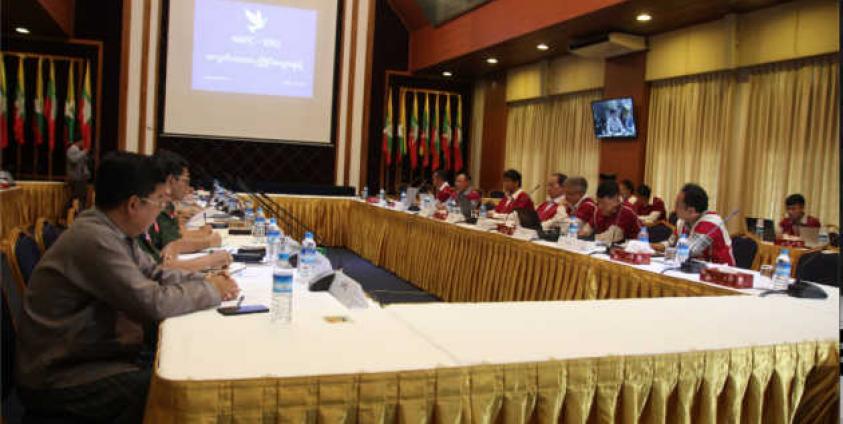The Karen National Union said the effectiveness and the usefulness of foreign funding has been nullified by need for ethnic armed organizations to seek permission from the government.
The National Reconciliation and Peace Center (NRPC), formed by the President’s Office to set policies and guidelines for reconciliation and peace process taking place, sent an official letter to 10 ethnic armed organizations (EAOs) who are signatories to the Nationwide Ceasefire Agreement (NCA) on September 3, 2019, informing them of the procedure.
The Karen Education and Cultural Department (KECD), one of the fourteen departments under the KNU experienced barriers starting a vocational college project in Karen State.
Saw Law Eh Moo, secretary of the KECD told Karen News that their plan to set up a vocational college began long before the NRPC letter and it is now restricting the project.
“We had come to agreements through a long negotiation process with relevant government ministries and departments to implement this project before this letter came out,” Said Saw Law Eh Moo, “Now, the letter has jeopardised the project.”
Saw Law Eh Moo said that the reason behind the NRPC’s recent letter is unclear to them, but it could be a means to supress and control.
“Maybe the government doesn’t want ethnic nationalities to be better off. Or maybe they want everything under their control, we don’t know,” said Saw Law Eh Moo.
Following the NRPC letter to EAOs, the Burma Ministry of Foreign Affair also issued a statement addressed to the United Nation, its specialized agencies and international organizations stating “the development assistances and projects to be provided or funded by UN Agencies to Ethnic armed organization (or) ethnic political parities in respective States and Regions should be informed to NRPC through the proper diplomatic channel…”
Padoh Saw Taw Nee, head of the KNU’s Foreign Affair Department said the government’s tone in the two letters is different in communicating the same message.
“For the mutual respect, we wouldn’t have problems with informing the NRPC of what we are doing with funding provided by funding agencies, as stated in their letter sent to funding agencies. But in their letter sent to us, it is stated that we need to seek approval from the NRPC – this is not acceptable, as it is not in line with what has been agreed in the NCA.”
Several ethnic armed organizations who are signatories of the NCA publically opposed the NRPC position as it violates Article 25 of NCA, that states EAOs can receive aid “from donor agencies both inside and outside the country for regional development and capacity-building projects.”
Lt. Gen U Khin Zaw Oo (retired), secretary of the Peace Commission (PC), a delegation leading the negotiation with EAO under the NRPC, was reported in national media as saying that it is the responsibility of the government to monitor the in-flow of foreign aid to the country and if permission is sought officially, there would be no rejection of those proposals.
Lt. Gen U Khin Zaw Oo quoted on The Irrawaddy Burmese website said, “We would like to know how much funds are given to which groups because such groups will need to be accountable to use the funds for the benefit of the peace process. Now, the government doesn’t know if they bought weapons or have new conscription.”
Saw Mra Razarlun, of the Arakan Liberation Party (ALP), another ethnic armed organization and signatory to the NCA was reported in Shan Herald Agency for News (SHAN) as saying; “We want to work freely. If the government wants to make an effective peace process with EAOs, they should not block EAOs from getting more international aid.”
Padoh Saw Taw Nee said that the NRPC position is undermining mutual trust and it could lead to further tension. He said EAOs, NCA signatories, have been committed to try to bring in more groups, but with this development, non-signatory EAOs will have doubts about the NCA.
“It is difficult to extend trust to other ethnic armed organizations that have not signed the NCA because of this condition. This move is against the mechanism laid out in the NCA.”
Padoh Saw Taw Nee said that the KNU had officially responded to NRPC on the issues and they will make a collective response with other EAOs.
According to Padoh Saw Taw Nee, the KNU letter responding to the NRPC, pointed out the government’s conditions are completely in contrast to NCA provisions. The KNU urges the government to respect and acknowledge the NCA provisions by joint implementation and coordination. He said the letter also stated the KNU wants to be informed by the NRPC and PC of projects and program implementations in the KNU territory when the NRPC receive proposals for such development activities.







